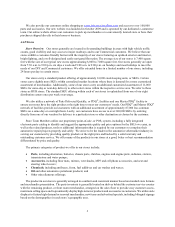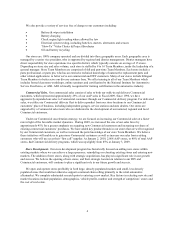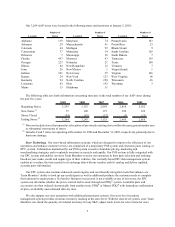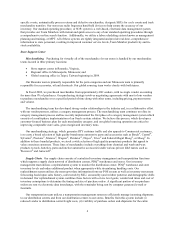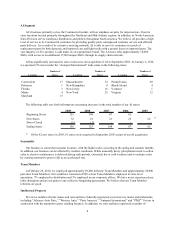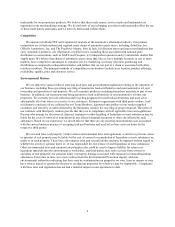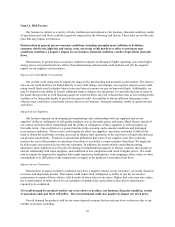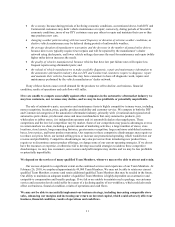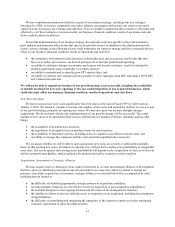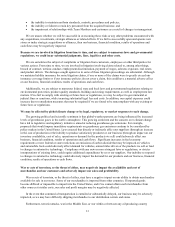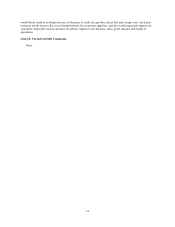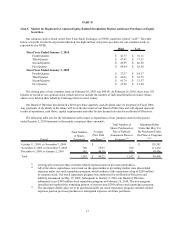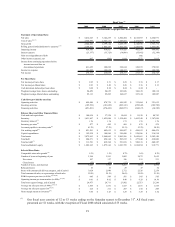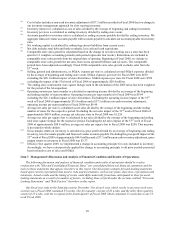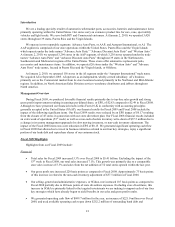Advance Auto Parts 2009 Annual Report Download - page 26
Download and view the complete annual report
Please find page 26 of the 2009 Advance Auto Parts annual report below. You can navigate through the pages in the report by either clicking on the pages listed below, or by using the keyword search tool below to find specific information within the annual report. 13
• the inability to maintain uniform standards, controls, procedures and policies;
• the inability or failure to retain key personnel from the acquired business; and
• the impairment of relationships with Team Members and customers as a result of changes in management.
We are unsure whether we will be successful in overcoming these risks or any other problems encountered with
any acquisitions, investments, strategic alliances or related efforts. If we fail to successfully open and operate new
stores or make strategic acquisitions or alliances, then our business, financial condition, results of operations and
cash flows may be negatively impacted.
Because we are involved in litigation from time to time, and are subject to numerous laws and governmental
regulations, we could incur substantial judgments, fines, legal fees and other costs.
We are sometimes the subject of complaints or litigation from customers, employees or other third parties for
various actions. From time to time, we are involved in litigation involving claims related to, among other things,
breach of contract, tortious conduct, employment discrimination, payment of wages, asbestos exposure, real estate,
and product defects. The damages sought against us in some of these litigation proceedings are substantial. Although
we maintain liability insurance for some litigation claims, if one or more of the claims were to greatly exceed our
insurance coverage limits or if our insurance policies do not cover a claim, this could have a material adverse affect
on our business, financial condition, results of operations and cash flows.
Additionally, we are subject to numerous federal, state and local laws and governmental regulations relating to
environmental protection, product quality standards, building and zoning requirements, as well as employment law
matters. If we fail to comply with existing or future laws or regulations, we may be subject to governmental or
judicial fines or sanctions, while incurring substantial legal fees and costs. In addition, our capital expenses could
increase due to remediation measures that may be required if we are found to be noncompliant with any existing or
future laws or regulations.
We may be affected by global climate change or by legal, regulatory, or market responses to such change.
The growing political and scientific sentiment is that global weather patterns are being influenced by increased
levels of greenhouse gases in the earth’s atmosphere. This growing sentiment and the concern over climate change
have led to legislative and regulatory initiatives aimed at reducing greenhouse gas emissions. For example,
proposals that would impose mandatory requirements on greenhouse gas emissions continue to be considered by
policy makers in the United States. Laws enacted that directly or indirectly affect our suppliers (through an increase
in the cost of production or their ability to produce satisfactory products) or our business (through an impact on our
inventory availability, cost of sales, operations or demand for the products we sell) could adversely affect our
business, financial condition, results of operations and cash flows. Significant increases in fuel economy
requirements or new federal or state restrictions on emissions of carbon dioxide that may be imposed on vehicles
and automobile fuels could adversely affect demand for vehicles, annual miles driven or the products we sell or lead
to changes in automotive technology. Compliance with any new or more stringent laws or regulations, or stricter
interpretations of existing laws, could require additional expenditures by us or our suppliers. Our inability to respond
to changes in automotive technology could adversely impact the demand for our products and our business, financial
condition, results of operations or cash flows.
War or acts of terrorism, or the threat of either, may negatively impact the availability and cost of
merchandise and our customers and adversely impact our sales and profitability.
War or acts of terrorism, or the threat of either, may have a negative impact on our ability to obtain merchandise
available for sale in our stores. Some of our merchandise is imported from other countries. If imported goods
become difficult or impossible to import into the United States, and if we cannot obtain such merchandise from
other sources at similar costs, our sales and profit margins may be negatively affected.
In the event that commercial transportation is curtailed or substantially delayed, our business may be adversely
impacted, as we may have difficulty shipping merchandise to our distribution centers and stores.
Furthermore, terrorist attacks, war in the Middle East, or war within or between any oil producing country


